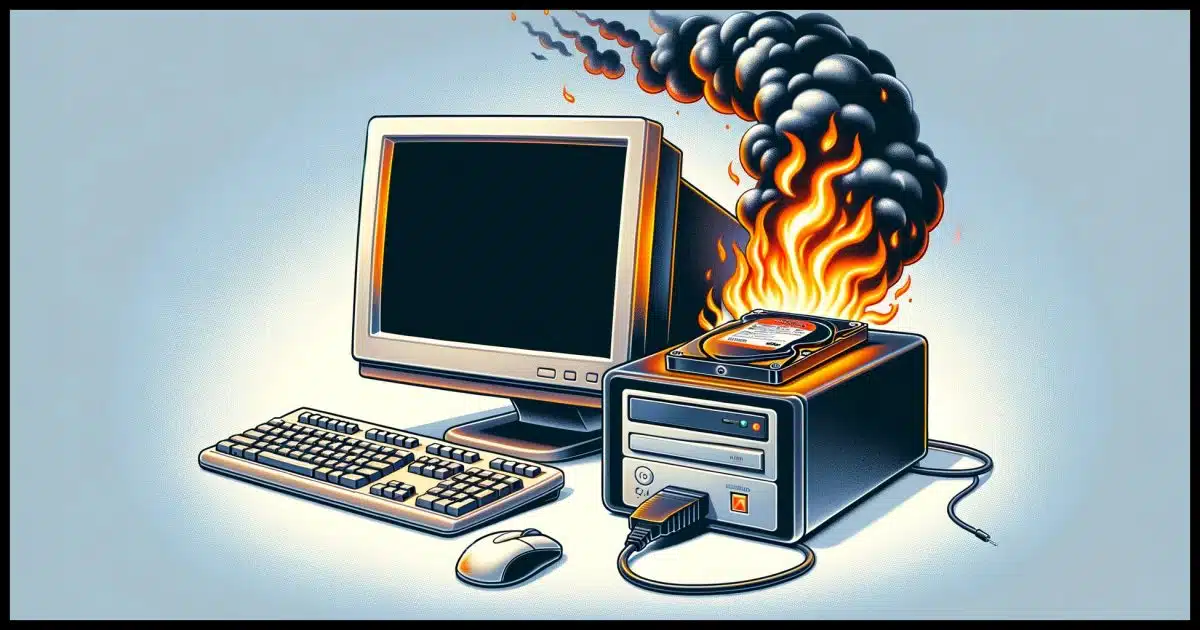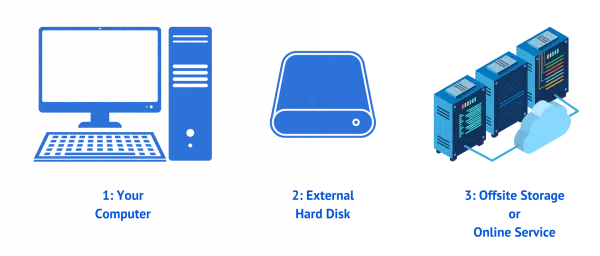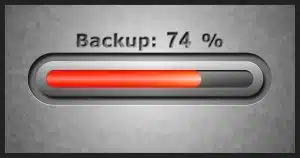Yes, you should.

Get that external hard drive.
Everything can fail, including the online service. Backing up isn’t as much about which backup technology you choose as it is about having multiple copies of your data.
Become a Patron of Ask Leo! and go ad-free!

Should I bother with an external hard drive?
The Golden Rule of backups states that data in only one place isn’t backed up. Multiple backups prevent data loss even if one fails. External drives and online services can fail, but having additional copies means you won’t lose anything. The Rule of Three says three copies on two different media types with one stored offsite maximizes practical protection.
The Golden Rule
The golden rule of backups is this:
If it’s in only one place, it’s not backed up.
When you have data backed up (meaning you have made multiple copies on any media: cloud, external drive, etc.) then data loss will only happen if all copies are destroyed at the same time.
Failure
You’re quite correct in that things can go wrong with external drives. They are hard drives, after all. They can and probably will fail eventually. But if you still have your original files, you just replace the external hard drive and resume backing up.
Online services can fail too. Your account could get hacked; your data could be destroyed. The service could suffer a failure of some sort or even go out of business. But again, you still have your originals; you move to a different backup service and resume backing up.
When it comes to backups, it’s a numbers game, and more is always better. However, if I could get everyone to back up to an external hard drive, 99% of the disasters that I hear about would stop happening.
The rule of three
So what about that 1% of disasters that wouldn’t be prevented with an external drive? Well, one rule of thumb is to have:
- Three copies
- On (at least) two different media types
- With one stored elsewhere
That reduces the probability of disaster even more.

For example, if you add an online backup service for your data in addition to backing up your entire machine to an external hard drive, then your data is protected from things that could take out both the computer and the external hard drive, like fire or theft.
I personally would not use an online backup as a replacement for backing up to a hard drive. But I do see it (and use it myself) as an additional part of an overall backup strategy to reduce the possibility of disastrous data loss further.
Do this
Above all, back up.
I recommend using an external drive, but regardless of the technique you choose, it’s critical that your important data be backed up and protected from disaster.
More protection: Subscribe to Confident Computing! Less frustration and more confidence, solutions, answers, and tips in your inbox every week.





Hi Leo,
You wouldn’t believe how many friends I have who tell me that one backup is enough. Oh how wrong they are. I constantly tell them (like you did): if you just have one copy, it’s just not a backup. I don’t know how many times I’ve recommended off-site backup to my people but the majority just wouldn’t listen and then come back to me later whining: PLEASE CAN YOU RESCUE MY DATA??? 🙂 Well, here is an article of why a backup of a backup is always a good choice: http://www.onlinebackupreviews.org/backup-backup/
To be clear, one backup is a backup. As long as it is a copy of the data. What I see are people moving data to their backup drive, thinking that’s a backup after they delete the original copy on their machine. They’re left with one copy, and only one copy – regardless of where you put it – is not a backup.
Until your friends experience a failure, it will be difficult for you to change their ways, most times.
I recently had a three year old hard drive in my computer. Suddenly, a blue screen of death popped up and that was the end of the drive. Not even the freezer method or several attempts in a USB hard drive enclosure would get the thing to work. Other drives in the enclosure did work, suggesting it was most likely the drive and not the enclosure.
For data that have special importance, the integrity can be further enhanced by creating redundancy using QuickPar. (On each of your three or more copies of the data of course.)
When storing on CD/DVD for a long period, best use a rewritable disk, not a single use disk, as the rewrite storage technology is different and less susceptible to bit rot.
I have an external hard drive connected to each of my computers for backups. I also have one with backups of my computers tucked away in a fire chest, which gets updated occasionally or when I happen to remember.
Prices have dropped a lot over the years, especially for HDDs, so it hasn’t been a problem to build up a collection of them. (Then again, according to my better half, it has become a problem.)
I’ve got a couple of 2TB drives that are still going even after going years past their warranty. The only one that I recall that did fail, failed because it was dropped.
Backing up everything is a practically religion for me. I have two external hard drives. One is always online and performs scheduled backups of my data daily with 30 rotating incremental copies. My Linux Mint operating system (Root) is also backed up daily with rotating incremental backups. Weekly I make a complete system backup to the second external drive and then disconnect it. My vital data is also backed up to a cloud service. What you didn’t mention is that most cloud services store your data on their servers unencrypted. This is probably fine for photos and such, but much of the really important stuff; bank & tax records, wills, social security info etc. needs to be protected from prying eyes. This can be done by encrypting the data before it’s sent to the cloud or by using a cloud service that offers end-to-end encryption (my method).
The problem with image backups as you advocate is that you have to restore the entire system, OS and data at the same time. Backing up the data and OS separately gives much more flexibility and allows restoration of the OS, individual files or folders or the entire user data separately.
You don’t HAVE to restore the entire image. Depending on the tool you’re using you can usually “mount” the image and copy out whatever you like.
I use Macrium Reflect on my main computer and EaseUS Todo on my others for system image backups and incrementals. I supplement those by using my OneDrive from Ms 365 to hold all of my documents, photos, etc. It’s been years since I needed to get individual files from a system image backup. But now there is an old email I need to get back which I know I’ll find on an older backup drive. You may not need your system image backup often, but the few times you need it will more than justify the cost and effort.
I keep my very large virtual machines on an external HD, as they will not fit on the internal HD (spin or solid state). Haven’t had an external HD failure in 15 years.
I’ve had 1 disk failure in 30 years. It’s was still worth the cost and effort effort of backing up.